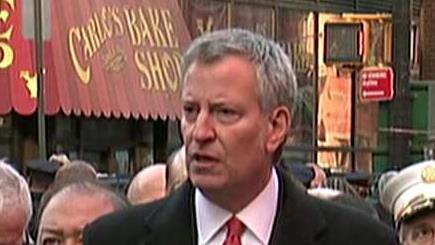NYC subway attack: What experts say needs to be done to protect commuters
A man wearing a homemade pipe bomb detonated his explosive in a subway passageway at the Port Authority Bus Terminal near Times Square on Monday, injuring four people and causing chaos to an estimated 5.7 million subway riders and 230,000 bus commuters, who use those facilities each day.
Authorities called the explosion an "attempted terrorist attack." But New York Gov. Andrew Cuomo added the suspect’s bomb was “an effectively low-tech device,” yet still calling the news of the explosion “very disturbing.”
Police later identified the suspect as 27-year-old Akayed Ullah, who was hurt from the explosion and taken into custody.
"Thank God the perpetrator did not achieve his ultimate goals. Thank God our first responders were there so quickly, to address the situation,” New York Mayor Bill de Blasio said during a press conference, adding that “at this point in time, all we know of is one individual" carrying out what he called a failed attack and there was "no credible and specific threat directed at New York City right now."
However, the incident still rocked the Big Apple, who has the highest rate of public transportation use of any city in the U.S., with 54.2% of the work population using public transportation to commute to work, according to the U.S. Census Bureau.
“Pipe bombs are relatively easy to manufacture and the vulnerable nature of the subway system has proven itself to be the perfect soft target,” Lt. Randy Sutton, a retired lieutenant with the Las Vegas Metropolitan Police Department, tells FOX Business. “This type of device is detectable by bomb-sniffing dogs, and perhaps the addition of more of those trained K9 teams is now something that must be considered.”
Carl Berkowitz, a transportation and traffic engineering expert, adds that tackling massive transportation threats and incidents shouldn’t be left solely on law enforcement though, that the general public needs to step in as well.
“[They] need to set up communication hot spots so that the public can participate in making the system safe and secure,” Berkowitz tells Fox Business, adding that CCTV surveillance needs to be expanded throughout all subway stations.
Mustafa Tameez, a Muslim-American Democratic political consultant and former Bush administration DHS official, says while this incident has rattled some, the important thing to remember is that New York City’s security apparatus is already strong and that is apparent because “so few incidents have taken place since 9/11.”
However, he does say that authorities need to do a better job in countering violent extremism and “cutting the cord between would-be terrorists and recruiters in ISIS and Al-Qaeda.”
“This latest incident shows the ineptitude in ISIS's capabilities, another bomber who didn't know what he was doing ended up hurting himself. We're fortunate to have fairly strong police, FBI, and other alphabet soup agency apparatuses. What we've learned in the past is that every time we build a security perimeter of some type, the terrorists strike just outside of it,” Tameez tells FOX Business.
Raheem Kassam, author of “No Go Zones,” and Muslim-born Islamic extremism expert agrees, adding the “real security” needs to come from understanding the threats before they reach us.
“This isn’t one ideology or one nation that is waging war on us. There are a plethora of countries creating terrorists with their cultural, religious and education systems. This latest attempted attacker I bet will be from the Deobandi school of political Islam, which is very popular in Bangladesh, India and England and growing in the U.S.,” Kassam says.
He also says that the Trump administration needs to ban the Muslim Brotherhood to stop incidents like this one from happening.
However, Michael Baker, a former CIA operative and co-founder of Diligence LLC, says the public needs to remember that “you can’t prevent everything.”
“You could, but it would mean an unacceptable lockdown on people's ability to move relatively freely and have an acceptable level of privacy. As with everything involving security, it's a balancing act,” Baker says.




















